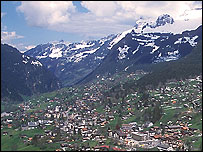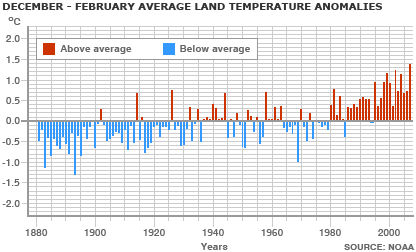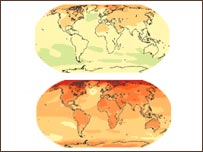This winter in the Northern Hemisphere is the warmest winter since 1880

This year, winter resorts do not have visitors because there is no snow
This winter in the Northern Hemisphere is the warmest winter recorded for 125 years, a US government agency said. The surface temperature on the land as well as on the sea surface from December to February increased by 0.72C (1.3F) compared to the average.
The National Agency for the Sea and Atmosphere (Noaa) said that the El Nino warm water flow, which runs in many parts of the Pacific, has also contributed to warming this winter. The agency does not say that rising temperatures are a proof that people are involved in global warming.
Noaa said the temperature continued to rise by one fifth of the Celsius every decade. The ten warmest years recorded since 1995.
Meteorological experts predict that 2007 may be the warmest year recorded. Mr. Jay Lawrimore of Noaa's Climate Data Storage Center said: "Many factors have contributed to high temperatures in the long run as well as the warm water of El Nino in the Pacific Ocean." He added: "We are not saying that this year's winter is evidence of the effects of greenhouse gases."

However, Mr. Lawrimore said that the study is part of a research process conducted by the Intergovernmental Panel on Climate Change (IPCC), which published a report in January. saying that " it is possible " global atmospheric changes are caused by human involvement.

Map of climate change
He said, "We learned through the conclusions that this warming momentum has occurred in part because of the increased amount of greenhouse gas emissions."
The IPCC Council concluded that at least 90% is due to emissions rather than natural changes on the surface of the globe.
Scientists predict that the temperature will rise from 1.8C to 4C by the end of the century, but there is also a speculation that it may only increase by 1.1C (2F) or maximum by 6.4C (11.5F).
- Cold winter in the northern hemisphere
- European cold, Australia is the hottest 150 years
- Beautiful spring moment in the Northern Hemisphere
- Switzerland: the warmest winter in history
- The Northern Hemisphere fish is found in Vietnam
- Northern Hemisphere will destroy this year?
- Solar energy changes create cold winters in the North
- The Arctic melted, making the winter colder
- Video: Why do storms rotate counterclockwise?
- Radioactive clouds spread in the northern hemisphere
- In the future, it will be 25 hours long because the Earth slows down
- Flu epidemic of A / H1N1
 Is the magnetic North Pole shift dangerous to humanity?
Is the magnetic North Pole shift dangerous to humanity? Washington legalizes the recycling of human bodies into fertilizer
Washington legalizes the recycling of human bodies into fertilizer Lightning stone - the mysterious guest
Lightning stone - the mysterious guest Stunned by the mysterious sunset, strange appearance
Stunned by the mysterious sunset, strange appearance Grandson 'resurrects' dead grandmother using AI, causing a storm online in China
Grandson 'resurrects' dead grandmother using AI, causing a storm online in China  Surprised by the condition of the person who injected 217 doses of Covid-19 vaccine into his body
Surprised by the condition of the person who injected 217 doses of Covid-19 vaccine into his body  Secret documents reveal 'unexplained' discovery about Egyptian pyramids
Secret documents reveal 'unexplained' discovery about Egyptian pyramids  Devastating scenes in Spain after massive flash floods, government declares 3 days of national mourning
Devastating scenes in Spain after massive flash floods, government declares 3 days of national mourning  What happens when a country is without power for too long?
What happens when a country is without power for too long?  Titan submarine crushed, 5 people on board died
Titan submarine crushed, 5 people on board died 